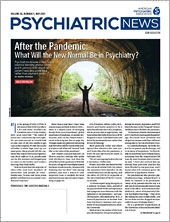Despite higher acute and long-term health care costs, patients with serious mental illnesses (SMI) experience greater barriers to preventive and routine health care and often receive care that is fragmented and inadequate. In this4- month’s column, Aniyizhai Annamalai, M.D., describes how COVID-19 highlights the suboptimal medical care given to patients with SMI and the need for psychiatrists to support COVID-19 management for the inpatients they care for.
—Jürgen Unützer, M.D., M.P.H., M.A
My role in COVID-19 prevention and management at our local state psychiatric facility has reminded me of the importance of integrating medical care into psychiatric treatment for patients with serious mental illness (SMI). I am a dually trained internist and psychiatrist, and as the infection prevention lead at our facility, a critical task has been to serve as a consultant to the inpatient psychiatric teams on COVID-19 management.
While COVID-19 has altered practice for all mental health professionals, those caring for people with SMI have had more direct roles in managing COVID-19 in their patients. COVID-19 highlights the structural deficits in medical care for those with SMI. Many patients with SMI do not have a primary care provider. Many live in residential group homes in the community, and a subset of patients with SMI are in treatment at state psychiatric facilities for months to years. In these settings, mental health clinicians frequently are responsible for coordinating and overseeing medical care received by patients.
Patients infected with mild COVID-19 are not admitted to general hospitals; instead, they are advised to isolate from others and self-monitor at home. For many with SMI, home is a group residence or a state psychiatric facility, and COVID-19 management has to occur in these settings. Patients who develop moderate to severe COVID-19 should be transferred to a general hospital. But psychiatric care in that setting may be suboptimal, and so those with mild COVID-19 are served better when managed on a psychiatric unit. This requires a certain level of direct involvement in medical care by psychiatric staff. They must closely monitor patients with COVID-19, provide treatments, and determine threshold for transfer to an acute care hospital. Staff must take measures to prevent transmission of disease in high-risk inpatient units, which are congregate living structures that house patients who may be unable or unwilling to follow infection prevention protocols.
In my role as the primary care and infection prevention consultant, it became obvious to me that psychiatrists needed to be the drivers of COVID-19 management for inpatients they knew well. Whether it was a patient who always responded affirmatively to screening questions or someone for whom any symptom had to be drawn out, psychiatrists were best able to determine when there was sufficient clinical suspicion to test for COVID-19. In making testing decisions, we had to balance risk of transmission of undiagnosed COVID-19 with the consequences of forced isolation of unwilling patients. Also, the psychiatric treatment team was best able to work with patients so they would adhere to recommended interventions. And finally, knowledge of a patient’s medical condition, such as chronic tachycardia from clozapine, was key when monitoring COVID-19-positive patients.
There were certainly challenges that included fear among nursing staff in the face of a serious infectious disease, but with experience managing the illness, their confidence and competence increased. Our psychiatrists were willing and capable of managing patients with COVID-19 with appropriate consultation.
While I use COVID-19 as an illustrative example, psychiatrists can have a greater impact on patient morbidity and mortality when managing chronic conditions like hypertension and diabetes. With adequate training and appropriate consultation, psychiatrists can provide a higher level of medical care than what is currently expected of them.
“Reverse integration” refers to integrating primary care into psychiatry. The Substance Abuse and Mental Health Services Administration has supported many Primary and Behavioral Health Care Integration projects, but the heterogeneity of these initiatives has not allowed for a robust assessment of the effect of these programs on health outcomes. There is some evidence that a model utilizing a nurse care manager to coordinate care has a positive impact on primary care engagement. But given that the mortality gap for those with SMI has not been significantly reduced, we need to create other paradigms. The model of psychiatrists leading team-based care that includes primary care consultants, care managers, and trained nursing staff similar to the Collaborative Care Model led by primary care providers should be developed and studied.
At a time when pandemic response has shown us yet again that patients with SMI are vulnerable to receiving suboptimal medical care, we have an opportunity to redesign care within psychiatry and empower psychiatrists to participate in the holistic care of their patients. ■

